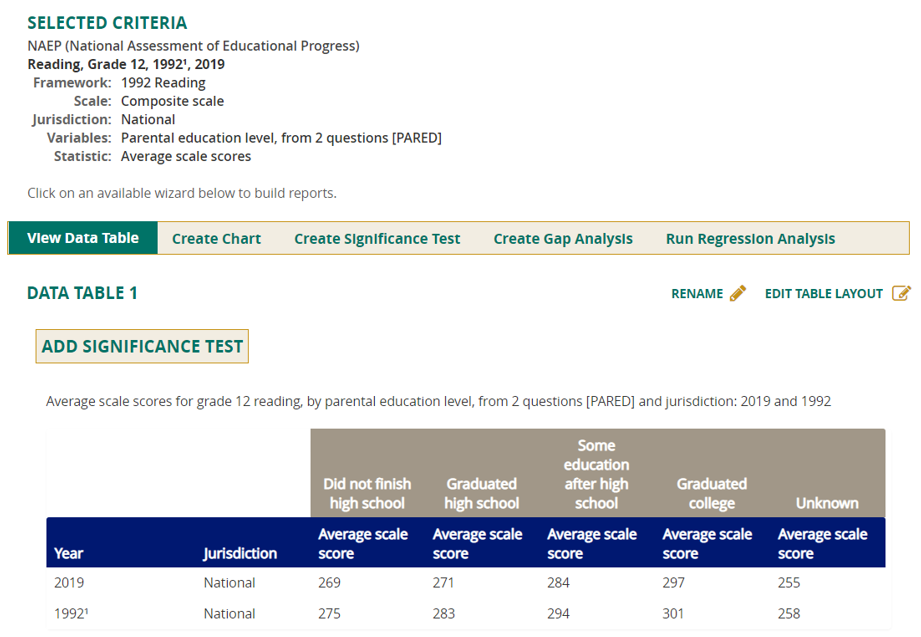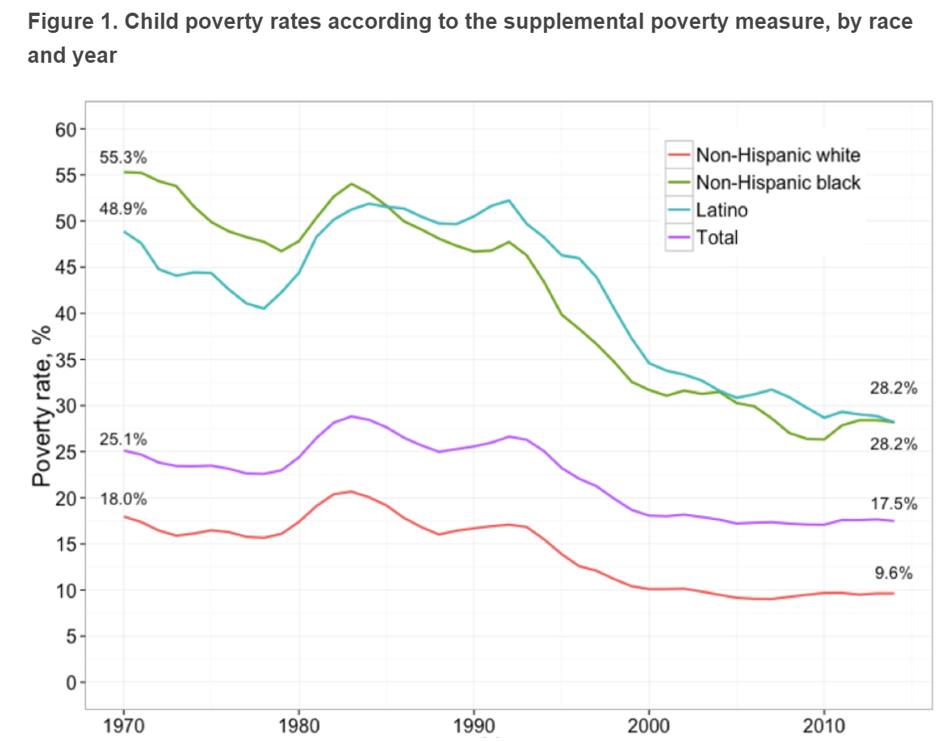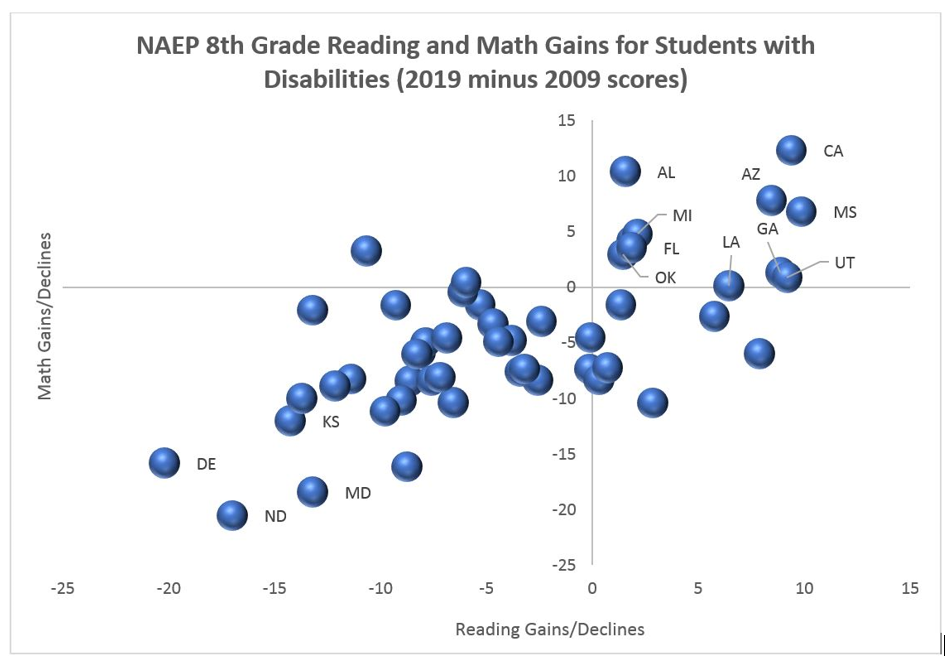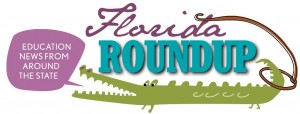
![]() The performance of American public schools was in decline before the pandemic struck; based on the latest results from the National Assessment of Educational Progress released Wednesday by the National Center for Education Statistics, things are likely to only get worse from here.
The performance of American public schools was in decline before the pandemic struck; based on the latest results from the National Assessment of Educational Progress released Wednesday by the National Center for Education Statistics, things are likely to only get worse from here.
The data show the average reading score for the nation’s 12th-graders declined between 2015 and 2019. Meanwhile, there was no statistically significant change in 12th-graders’ average mathematics score for the same time period.
Bottom line: considerably more money per pupil was spent to get the same not-so-great results.
The tests upon which the data is based were given in spring 2019, before the COVID-19 pandemic. The indications are now worse: Inflation-adjusted spending per pupil is up, childhood poverty is down, and scores are down rather than flat.
The earliest 12th-grade reading score in this series comes from 1992. The Class of 1992 benefited from a nationwide average of $105,560 in 2018 constant dollars spent on their K-12 education. The Class of 2017, the cohort from which we have the most recently available data, had a nationwide average of $158,431 in constant dollars spent on their education – approximately 50% more. The figure for the Class of 2019 will be even higher.
Which class, 1992 or 2017, demonstrated better reading ability? Let’s break down the results by parental education.

Regardless of the level of a parent’s education, reading scores were lower for the Class of 2019 than the Class of 1992. All of the above differences are statistically significant.
Now take a look at the chart below, provided by Michael J. Petrilli from the Thomas B. Fordham Institute, showing the decline in childhood poverty rates from the 1980s and 1990s.

What the chart shows: higher spending, less poverty and lower national achievement.
Mind you, this was the trend before the current massive decline in instruction time due to the pandemic. I’ll dare to predict that if the NCES manages to conduct the scheduled 2021 NAEP, exams scores will decline across the board and achievement gaps will grow. K-3 kids who are in their literacy acquisition windows, for instance, in districts like Los Angeles Unified, Clark County Nevada and New York have been receiving less than half the amount of instruction time delivered during a normal school year.
And finally, special education trends were a disaster in many states before the pandemic, as detailed in this chart.

It’s difficult to imagine that this already dismal chart won’t look even worse with 2021 data, coming in the aftermath of generally reduced instruction time and special education being attempted using the Zoom platform. We are not out of the pandemic yet, but the academic damage seems likely to greatly outlive the virus.
These most recent data came among favorable conditions of declining poverty and increased spending. Very soon, we’ll be forced to face what happens when you reverse these favorable trends and we end up with a large percentage of students with huge academic deficits.
Buckle up.
 Framers may weigh in: The so-called "framers" of the 1998 constitutional amendment that requires the state to provide high-quality public schools will be allowed to file a brief in a court challenge of a state education law, the Florida Supreme Court rules. The group Citizens for Strong Schools is suing the state, claiming it is not fulfilling its obligation to provide a "uniform, efficient, safe, secure, and high quality system" of public schools. Ten of the members of the 1998 Constitution Revision Commission had asked to be allowed to file a brief on their intent in the phrasing of the amendment, in support of the suit. The state objected, and will still be allowed to challenge the brief. News Service of Florida.
Framers may weigh in: The so-called "framers" of the 1998 constitutional amendment that requires the state to provide high-quality public schools will be allowed to file a brief in a court challenge of a state education law, the Florida Supreme Court rules. The group Citizens for Strong Schools is suing the state, claiming it is not fulfilling its obligation to provide a "uniform, efficient, safe, secure, and high quality system" of public schools. Ten of the members of the 1998 Constitution Revision Commission had asked to be allowed to file a brief on their intent in the phrasing of the amendment, in support of the suit. The state objected, and will still be allowed to challenge the brief. News Service of Florida.
Union threatens lawsuit: The Florida Education Association says it will file suit today against the portion of H.B. 7055 that allows teachers unions to be decertified if they can't maintain more than half the eligible membership. "This is about equity and fairness, and being targeted and singled out," says FEA president Joanne McCall, who says the law applies only to teachers unions. Gradebook.
Broward bond projects: A watchdog group says it's time for the Broward County School District to outline a plan for fixing decaying schools or admitting it can't be done before the deadline it set. Florida TaxWatch, which was hired by the district to monitor the progress of the work scheduled under an $800 million bond referendum approved in 2014, found that only 10 percent of the identified projects have been completed and only 12 percent are under construction. “We are desperately behind and we need to know why," says board member Heather Brinkworth. Sun-Sentinel. A timeline of the bond program. Sun-Sentinel. (more…)
 Segregation and graduation: The resegregation of Florida schools, reported in a recent study, is likely to have a negative impact on graduation rates in the state. The authors of another study say dropout rates rise a percentage point for black students and 3 percentage points for Hispanics in U.S. school districts that don't require integration of schools. Education Week.
Segregation and graduation: The resegregation of Florida schools, reported in a recent study, is likely to have a negative impact on graduation rates in the state. The authors of another study say dropout rates rise a percentage point for black students and 3 percentage points for Hispanics in U.S. school districts that don't require integration of schools. Education Week.
Board term limits: Erika Donalds, a member of the Collier County School Board and the Florida Constitution Revision Commission, is proposing an amendment to the state constitution that would impose term limits on school board members. She suggests no board member be allowed to serve more than eight consecutive years. If it's approved for the ballot by the commission, it would need the support of 60 percent of voters to go into effect. Gradebook.
Libre in Florida: The billionaire Koch brothers are financing a campaign called the Libre Initiative in Florida and several other states to convince Hispanic families of the merits of school choice. Included are bilingual mailings that back the law providing financial incentives for charter schools to move into areas with persistently struggling schools. The president of the Thomas B. Fordham Institute, Mike Petrilli, says the Kochs' selection of school choice as a core issue is "telling us they have good reason to believe this is an issue that’s resonating with Latino families.” Politico.
Board member investigated: An anonymous complaint prompts the Florida Department of Education to order an investigation of a Hillsborough County School Board member's actions. According to a tip, Susan Valdes used her influence to have a district department dissolved so the staff couldn't detect problems with construction work done by her friends and campaign donors. Tampa Bay Times.
 Back in session: Most Florida public school districts reopened Monday or are expected to today or tomorrow, according to the Florida Department of Education. School districts are also making decisions on how they'll make up the time missed for Hurricane Irma. Florida Department of Education. Orlando Sentinel. Sun-Sentinel. Gradebook. Florida Times-Union. Bradenton Herald. Daytona Beach News-Journal. WSVN. Fort Myers News-Press. Naples Daily News. Students in 48 Florida counties affected by the hurricane will get free meals at school through Oct. 20. News Service of Florida. Associated Press. Miami Herald. Tampa Bay Times. Palm Beach Post. Florida Today. WINK. Daily Commercial. Lakeland Ledger. Bradenton Herald. Gainesville Sun. Daytona Beach News-Journal. In Collier and Lee counties, several child-care centers say they will take in students until schools reopen next Monday. Naples Daily News. Many school signs in south Florida are missing or broken, and officials are urging drivers to slow down and be cautious through school zones. Sun-Sentinel. Florida Virtual School will provide remote access to all students displaced by the hurricane. Governor's office.
Back in session: Most Florida public school districts reopened Monday or are expected to today or tomorrow, according to the Florida Department of Education. School districts are also making decisions on how they'll make up the time missed for Hurricane Irma. Florida Department of Education. Orlando Sentinel. Sun-Sentinel. Gradebook. Florida Times-Union. Bradenton Herald. Daytona Beach News-Journal. WSVN. Fort Myers News-Press. Naples Daily News. Students in 48 Florida counties affected by the hurricane will get free meals at school through Oct. 20. News Service of Florida. Associated Press. Miami Herald. Tampa Bay Times. Palm Beach Post. Florida Today. WINK. Daily Commercial. Lakeland Ledger. Bradenton Herald. Gainesville Sun. Daytona Beach News-Journal. In Collier and Lee counties, several child-care centers say they will take in students until schools reopen next Monday. Naples Daily News. Many school signs in south Florida are missing or broken, and officials are urging drivers to slow down and be cautious through school zones. Sun-Sentinel. Florida Virtual School will provide remote access to all students displaced by the hurricane. Governor's office.
Testing schedule: The Florida Department of Education adjusts its end-of-course exam retakes in biology, civics, U.S. history, algebra I and geometry due to Hurricane Irma. The assessments can begin Sept. 18, but has left the final date open for now. It did the same for the retake of the 10th grade language arts exam. "We will offer as much flexibility as needed," Education Commissioner Pam Stewart wrote in a memo to superintendents. Gradebook.
ESSA extension: The U.S. Department of Education has granted Florida an extension to file its plan on how it will comply with the Every Student Succeeds Act. The deadline had been Monday, but it's now Oct. 13. Education officials cited the devastation of Hurricane Irma in extending the deadline. Politico Florida.
 Note: Today's roundup is longer than usual. It includes noteworthy Florida education news, blog and opinion pieces that appeared during our holiday break. Our Florida roundups are returning to their usual Monday-through-Friday schedule.
Note: Today's roundup is longer than usual. It includes noteworthy Florida education news, blog and opinion pieces that appeared during our holiday break. Our Florida roundups are returning to their usual Monday-through-Friday schedule.
Lawsuits. A lawsuit challenging Florida school choice legislation is dismissed. Associated Press. Miami Herald. Education Week. News Service of Florida. Palm Beach Post. Capitol News Service. WFSU. Fort Myers News-Press. redefinED. The Tampa Tribune praises the outcome in an editorial. A separate lawsuit challenging the tax credit scholarship program threatens families' options, a USA Today guest column argues. The program is administered by Step Up For Students, which co-hosts this blog.
School choice. A Tampa Bay Times section on school choice highlights the growth of private and charter schools, the difficulty of getting a seat in some in-demand programs, increased offerings from the Pinellas County school district and expanded private scholarship programs. Duval schools draw attention to non-magnet choice programs. Florida Times-Union. Parents need timely school grades and other information to make the best school choices, the Sun-Sentinel argues in an editorial.
Common Core. States in the market for higher education standards are bound to find some overlap with the Common Core State Standards, the Fordham Institute's Michael Petrilli writes in the Tampa Bay Times.
Charter schools. Fewer Florida charter schools closed, and other indicators were positive even as scrutiny increased in 2014. Naples Daily News. Florida's well-known Charter Schools USA may take over as operator of schools in a troubled Pennsylvania district. York Daily Record. A planned Manatee charter pulls its application after the state appeals panel supports its rejection. Bradenton Herald.
Catholic schools. Catholic schools constitute the second-largest school system in Pinellas. Gradebook.
Virtual education. A new virtual learning center aims to provide an alternative to typical home education. St. Agustine Record.
Education politics. Former Florida Gov. Jeb Bush steps away from his education foundations, in what is seen as a step toward a possible presidential run. Washington Post. Education Week. A husband-wife duo includes a state representative and a school board member who support parental choice and want less bureaucratic regulation of schools. Daytona Beach News-Journal.
PLSAs. An article in National Affairs delves deep into the theory of action behind new parental choice scholarship account programs.
School choice supporters should back more government oversight of private schools that accept vouchers and tax credit scholarships because the choice movement would be better off without schools that are “by any measure awful.”
So argued Michael Petrilli, executive vice president of the Fordham Institute, in a live chat Tuesday with redefinED. Petrilli pointed to the think tank’s work with charter schools in Ohio to ground his position.
“Some parents are choosing schools that are, by any measure, awful,” he wrote during the chat. “ ‘By any measure’ is important. I totally understand that math and reading scores are imperfect gauges of school quality, and I understand that choice schools in particular might be ‘adding value’ in ways that don’t show up on test scores but do show up in terms of other, even more important, outcomes, like high school graduation, college-going, or wages.”
“Still, there are schools out there that might mean well, but where it’s hard to see any kind of learning happening. We would be better off, in the choice movement, without them.”
Petrilli’s comments came a week after Fordham released a legislative tool kit that backed more testing, transparency and regulatory consequences for "voucher schools" – and sparked a flurry of criticism from many corners of the choice community. During the chat, he also politely criticized Florida’s tax credit scholarship program for not including sanctions for persistently low-performing schools. (The program is administered by Step Up For Students, which co-hosts this blog.)
“Florida's got the foundation of a good system in place: A well respected scholarship-granting organization (Step up for Students!) and a requirement that participating students take a standardized test, and the results be released. (As I wrote, I would marginally prefer that they take the state test, but it's not the end of the world that they don't.)”
“The main thing you DON'T do is act on the information from testing. And I do think that's a mistake. I would love to know if there are any extremely low-performing schools in your program (based on value-added). Just imagine how much more effective--and popular--your program could be if you weeded those schools (probably just a handful) out!”
You can read the chat in its entirety here:
Is parental choice alone accountability enough for private schools that accept students with vouchers and tax credit scholarships?
The pro-school-choice Fordham Institute says no. In a policy toolkit released this week, it again made the case for some measure of regulatory accountability – and promptly drew fire from other school choice stalwarts at the Friedman Foundation, the Cato Institute and elsewhere (see here and here).
To continue the debate, Fordham Executive Vice President Mike Petrilli will be our guest next week for a live, hour-long chat.
The chat is like a press conference, only it’s in writing and open to anyone with a good question. To participate, just come back to the blog on Tuesday. We’ll start promptly at 10 a.m. All you have to do is click in to the live chat program, which you’ll find here.
In the meantime, you can send questions in advance. Either leave them here in the comment section, send them to rmatus@sufs.org, tweet them to @redefinEDonline and/or post them on our facebook page. See you next week!
 Accountability in public education derives from a combination of government regulations and consumer choice. Historically, because we’ve had so little consumer choice in public education, regulations have been the dominant component of accountability. But now that school choice is becoming more ubiquitous, consumer choice is assuming a more prominent role.
Accountability in public education derives from a combination of government regulations and consumer choice. Historically, because we’ve had so little consumer choice in public education, regulations have been the dominant component of accountability. But now that school choice is becoming more ubiquitous, consumer choice is assuming a more prominent role.
Unfortunately, some of our most important public education policy wonks are devaluing the importance of consumer choice by using the term accountability as a synonym for regulations.
My friend and former colleague here at Step Up For Students, Adam Emerson, in criticizing the lack of required state assessments in Florida’s McKay Scholarship program, recently wrote on his Fordham Institute blog that:
“Virtually no accountability measures, however, exist in most of the nation’s special-education voucher programs, including the largest such program in the United States, Florida’s McKay Scholarship for Students with Disabilities.”
Parents choose to apply for and use a McKay Scholarship. If their needs are not being met at one of the more than 1,100 Florida private schools accepting the McKay Scholarships, they can vote with their feet and go to another school. To suggest this level of consumer choice equates with “virtually no accountability measures” is wrong.
Adam’s gifted colleague at Fordham, Mike Petrilli, made a similar error a few days later. He wrote that “Indiana’s voucher program has accountability in spades,” then ignored consumer choice and equated accountability only with required student testing and school grades. (more…)
 Shock and buzz. Tony Bennett’s loss was last night’s big jawdropper in the ed realm. But shock is already giving way to welling speculation that Indiana’s loss will be Florida’s gain.
Shock and buzz. Tony Bennett’s loss was last night’s big jawdropper in the ed realm. But shock is already giving way to welling speculation that Indiana’s loss will be Florida’s gain.
Education Week wrote that Bennett, the Hoosier State’s superintendent of public instruction, “could be a natural fit” for the opening in Florida. Education researcher Rick Hess said Bennett will land on his feet “given that folks are likely to be clamoring for his services (including the state of Florida, which is desperately seeking a new chief).” The Gradebook, the ed blog for the Tampa Bay Times, put this headline on its first post of the day, “Might Indiana superintendent stunner yield Florida commissioner candidate?”
Speculation that Bennett may be headed to the Sunshine State began well before last night’s loss. And it’s easy to see why. Bennett championed Florida-style reforms in Indiana, including implementation of a statewide voucher program. He’s part of the Chiefs for Change group formed by Jeb Bush’s Foundation for Excellence in Education. And he makes a lot of sense when he talks persuasively about new definitions of public education that aren’t either/or. “We have allowed our opponents to draw a caricature of us that says we’re against public schools,” Bennett said last spring at the American Federation for Children conference. “I’m not an adversary of public schools. I’m an advocate for public school children.”
Applications for the Florida commissioner post are due by Nov. 30. We called and emailed the Indiana Department of Education to see if we could find out about Bennett’s plans. If we hear back, we’ll let you know.
In the meantime, there’s also plenty of commentary today about why Bennett lost to Glenda Ritz, an elementary school media specialist. (more…)
A federal report released this week found charter schools in most states enroll a lower percentage of students with disabilities than traditional public schools, but also cautiously noted that “little is known about the factors contributing to these differences.” Nonetheless, the report drew widespread coverage and, to some critics of school choice, offered confirmation of charter school cherry picking.
I see selective scrutiny at play.
Since charter and magnet schools in Florida have so much in common - both tend to be themed schools that parents choose – I took a quick look at the disabled student enrollment for two neighborhood middle schools and two magnet middle schools in my home district of Pinellas County, Fla. The disabled enrollment in the neighborhood schools was 14.1 percent and 14.0 percent, respectively; the disabled enrollment in the magnet schools was 4.5 percent and 5.8 percent, respectively.
That’s hardly surprising. Admittedly, these are just four schools, but anyone who has worked in a school district with magnet schools knows magnet schools serve far fewer disabled students than neighborhood schools. Those of us with district experience also know Mike Petrilli of the Fordham Institute was correct when he wrote this week: “No single public school is expected to serve students with every single type of disability. In fact, traditional public schools regularly “counsel out” students with severe disabilities because they don’t have the resources and expertise to serve them. Many school districts operate separate schools (or programs) precisely for those kids.”
It’s wrong for any school - charter, magnet, neighborhood, private or virtual - to reject a student it can serve solely because of her disability. But it’s also wrong for a school to accept a student it cannot properly serve. (more…)